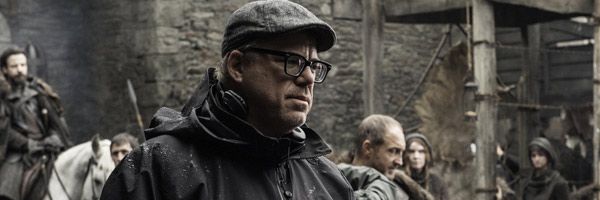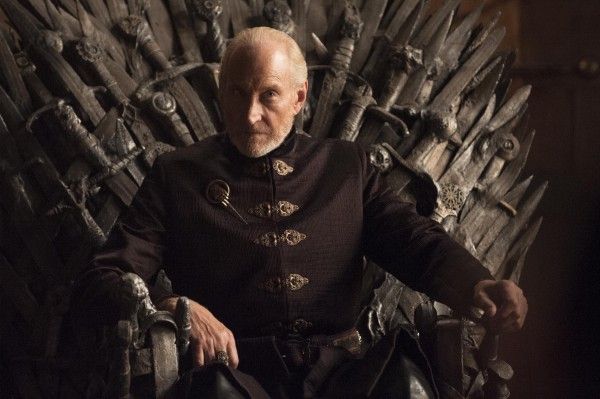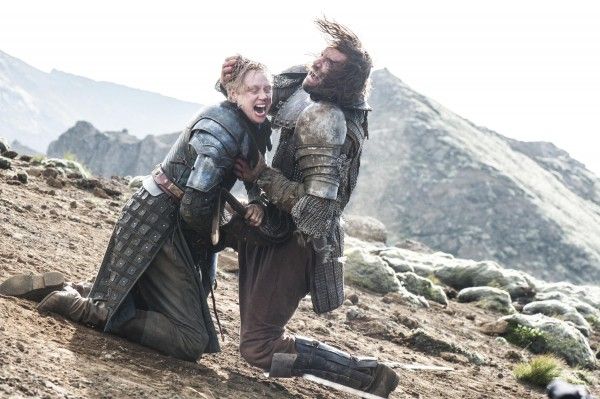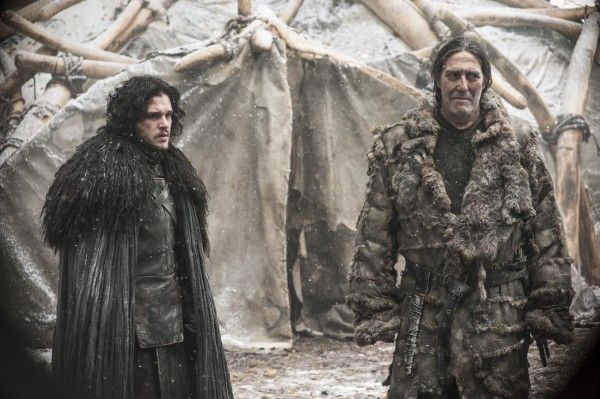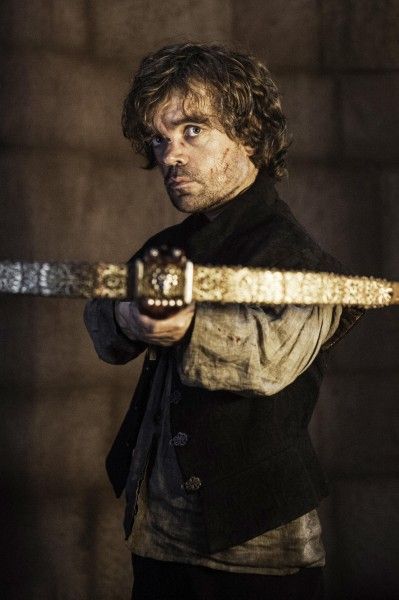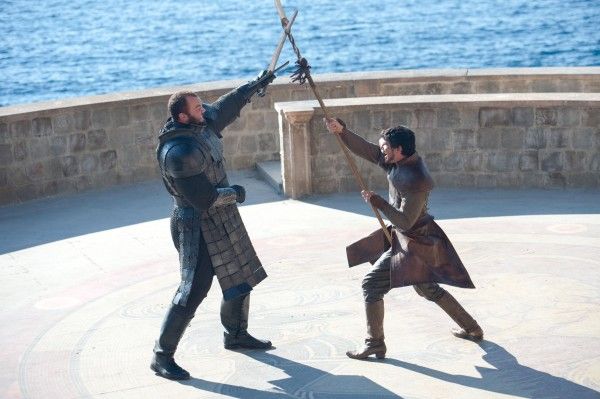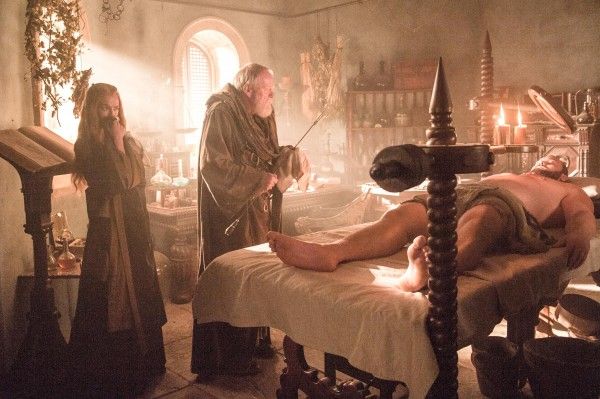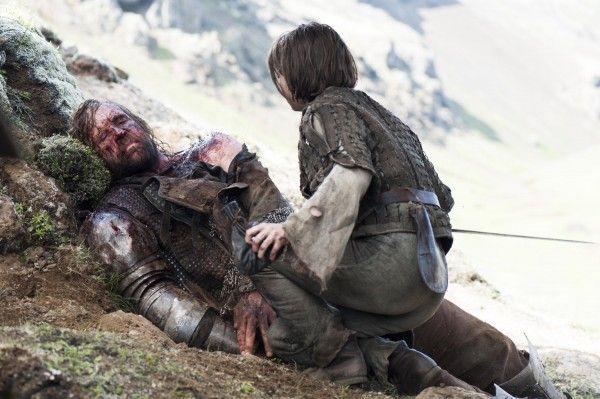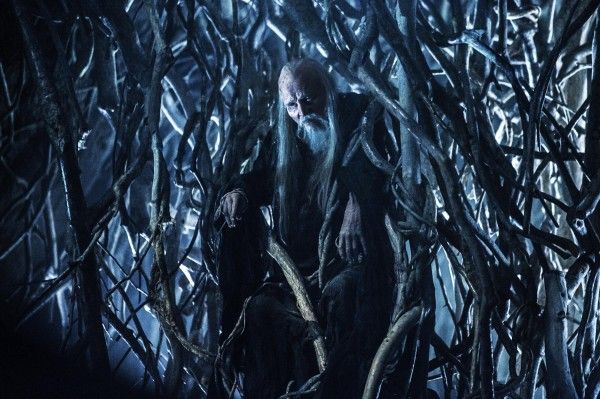Like the rest of the planet, I’m completely smitten with HBO’s Game of Thrones. Over the course of the first four seasons, the show has broken every conventional rule about what a TV show can do, and has grown in popularity every year. While we’re only half way through the seven seasons that showrunners David Benioff and D.B. Weiss are aiming for, if they keep the quality at the current level, Game of Thrones will go down as one of the best shows of all time.
Last Sunday, right after the season four finale aired, I got on the phone with director Game of Thrones director Alex Graves. We talked about directing a lot of the big deaths over the course of the season (he directed four episodes this season), why the finale was a longer episode, deleted scenes, the VFX, his thoughts on fan reactions to the events of the season, directing “The Mountain and the Viper” (episode eight) and the brutal fight at the end of the episode, how he'll be back for Game of Thrones season six, and a lot more. Hit the jump for what he had to say about Game of Thrones season four.
Warning: Spoilers about season four are discussed.
Collider: This season, you got to direct four episodes. We talked about the first two, but you covered Tywin’s death, Joffrey’s death, and now the finale. You got to do so many awesome scenes that are really impactful to the story. Did you know you were doing all these deaths well in advance?
ALEX GRAVES: Yes (laughs). I did. Basically, David, Dan, and George really liked my season three stuff a lot and they all came back to me and said, “If you come back we’re gonna give you all the big stuff.” I said, “Okay” and then I got the outline in the end of January, early February of last year and you read the outline and you go, “Oh boy, they really did. I better start working it out now.”
You got to kill a lot of people. Did you have a favorite going in? One that you were especially looking forward to?
GRAVES: No, my favorite scene was Brienne finding Arya and The Hound. I thought that the writing and the dialogue and the confusion that spirals into the fight was such a cool scene. I knew I was gonna film it in Iceland and I did a lot of—I really scouted and climbed around Iceland to find those locations and I just couldn’t wait to do that. Obviously the highest pressure scene, I guess it might’ve been a tie—what was the bigger death, Tyrion with Shae, Tyrion wth Twyin, and then Joffrey were all scenes where I wanted to deliver what was in the script married to what fans will be expecting, and it was a lot of pressure and I’m really glad it’s over.
The finale is a little bit longer than the other episodes, it’s 66 minutes. Was it always gonna be a longer episode from the get-go?
GRAVES: No, it was worried that it would be but the great thing was that when I finished my director’s cut, it was 66 minutes long and I was worried about—because I’m really good at getting things down to time and killing my darlings, and I actually turned it in long. A couple weeks went by and HBO had seen it and David Benioff called and said, “We got the email. It’s going to air at 66 minutes” (laughs). I was so happy. As you can see, so much happens, and yet you don’t want to take out any of those smaller moments that would save time if you cut them out, but they’re gems. You don’t want to speed up Peter’s reaction killing Shae or something. So I was really happy about that.
I think I speak for a lot of people when I say this, if every episode was an hour and 10 minutes, an hour and 15 minutes, even if they ran a little bit long I think most people would be OK with it.
GRAVES: (laughs) It’d be a little hard to broadcast. But yeah, I think we’ll agree on that.
When we spoke last time, you were mentioning that the VFX were going to be worked on until the very last second. I now understand why. When did you finish the episode?
GRAVES: I believe it was finished about two weeks ago.
Oh so you’ve actually had a little bit of time with it.
GRAVES: Yeah, it didn’t feel quite so long in the tooth as it might have. It was almost two weeks ago, which is still pretty tight, but it was good because they knew what they had and it was all finished and HBO was really happy.
You mentioned you cut it down to 66 minutes, you cut out a few things. When you’re doing four episodes in a season, are there good deleted scenes?
GRAVES: There weren’t any deleted scenes, it was just a matter of tightening stuff. I didn’t have any deleted scenes in what I did as far as I know. It’s very unusual on Game of Thrones for there to be a deleted scene because the scripts are pretty locked in. There’s rarely a reason to say, “Hey, we don’t need this scene.” You can certainly shorten things and tighten things, we tightened up Jon’s walk to Mance Rayder’s tent. That was something that got tightened up a little bit because I had shot the hell out of that.
There’s a tone of finality to a lot of the storylines that are happening in the finale. Can you talk about framing that when there’s all these chapters that are closing?
GRAVES: That’s a great question because really tackling it meant—I kept going back to David and Dan and saying “What happens going forward?” because I want to make sure that I don’t direct something that feels like the final episode of the show. Hopefully when people have seen even next season and beyond, they’ll look back and they’ll say as you would say of George’s books, “That was when everything just really turned towards Part Two.” It has a sense of finality to it, but it is really a turning point.
It’s gonna be a real long year for me.
GRAVES: (laughs) It’s gonna be worth the wait.
Oh I’m sure. What surprised you as you were watching the season with fans chiming in on Twitter and such? As the season went on, what surprised you that maybe you weren’t expecting or that you maybe wish you could tweak something because someone made a really good point?
GRAVES: (thinking) There’s so many things I would tweak I can’t even begin to tell you. I would do anything I could to try to make sure that Lena Headey wins an Emmy. I might’ve made Oberyn’s head smashing a little shorter, and there are one or two pacing issues with Joffrey’s death that I’ll obsess about until the end of my life. But other than that—what was great about this season was hearing how attached people are to the characters are now, and how opinionated they are and how well they know them. Because if you remember—and people forget this—the first two years of Game of Thrones everybody was going, “I don’t know what’s going on, but I really like it.” And you really didn’t know what to make of a lot of people, and now it’s changed and people aren’t really talking about that. Now it’s like you’re watching West Wing or Friends, you know the characters and you’re like, “What in the world is going to happen?” And one of the things that’s interesting about how they’re doing the show is that the audience almost knows more than the characters do in some of these scenes, and the extent of that is unique. So it’s grown into a different show in a way. It’s sort of grown into a different experience watching it.
I definitely want to touch on the episode “The Mountain and the Viper” because the battle scene at the end is more brutal than a lot of horror movies. Everyone I spoke to was like, “That is such a brutal sequence at the end”.
GRAVES: (laughs)
Talk a little bit about filming that one sequence and did you ever get nervous thinking, “Maybe this is a little bit too hard”?
GRAVES: Oh yeah, I mean sure. Totally. And honestly it’s cut down from what happened with the makeup on set. The thing is, obviously on the one hand you’re really trying to weigh the balance of you think Oberyn’s gonna win and whammo, in 20 seconds he does not and it’s a complete shock. That combined with the fact that he gets killed by the Mountain—here’s where a lot of it comes from: the Mountain is mortally wounded, he’s dying. He barely makes it, as you saw in the finale, he’s basically being eaten alive by this poison. All he’s got is his hands, and that’s it. So he rolls over and he smashes his head with his hands, it’s all he’s got to use so he does it. There is that odd practical part of it, but the other thing is that there is a story down the road that has to do with how upset people are that Oberyn is murdered so viciously, so that’s also sort of the setup for “I’ll never forget what happened that day.”
There is one shot that I remember in that sequence where you see the teeth go flying. How long did it take you to get that shot?
GRAVES: (laughs loudly) When they saw that storyboard they were like, “Oh God, how many takes are we gonna need to do that?” We did that in two takes. We used the second take, and I threw the teeth.
It’s so brutal. I rewatched that scene because it’s such a well-directed scene and it’s so, so brutal.
GRAVES: But it’s also you have that great situation that you have like in Jaws where you go, “Okay this is the shot where everyone’s gonna go, ‘Oh my God, he might get killed’ and then you’ve got like eight shots before you’ve gotta kill him,” and it’s like what happens in that shot operatically where it’s just like, “No, no, no, no this can’t be happening!” And the teeth were part of that.
It’s such a great sequence also because you’re rooting for Oberyn and basically if he had just stayed away from the Mountain, he’d have won.
GRAVES: Well my motto was “Never Monologue a Clegane”, because Beric Dondarrion and Thoros were messing around with The Hound and Beric essentially got killed, even though he got to come back, and then the monologue is just a foolish thing to do. But it’s also psychological state of mind, he can’t get over his sister.
Jumping back into the finale, was that the same shooting schedule as other episodes?
GRAVES: Yeah, it’s all the same.
How long did it take you to do the Brienne/The Hound fight sequence in Iceland?
GRAVES: The sword fight was done in I think four days. The thing is, an entire day is shooting the scene that precedes the fight, and so then the fight was done in, I guess it was four days. Then the other thing is Arya and The Hound are the fourth day, where he’s dying, because that’s a big scene. We actually shot some other stuff that day, but filming Rory begging to be killed, that took a little while.
I haven’t read the books, but I would imagine the Tree Man will be playing into future installments next season. How involved in the creation of the look of the character were you? Was that directly out of the book? Can you talk about directing that and the look?
GRAVES: Well he’s called The Greenseer in the book, and he’s also called the Three-Eyed Raven because you’ve gotta have at least two or three names in Game of Thrones. It was very much taken out of the books. It was very drawn and redrawn by me and the production designer and people trying to really make sure we found our way in terms of how to integrate him into the roots and how he should look and what his beard would look like integrated into the roots. We found these great white tree roots and we got tons of them and they were piled high in the parking lot, and the art department basically went in and created root-by-root a performance art space. It actually looked like a super cool L.A. night club or New York night club. There were just all these white roots against all this black cave, and then frankly a lot of it was the lighting and my DP, who just lit it to where you could see so much.
But the character is very important and has been around for a long time and will be around—I think he’s around in the future, I’m not sure, but the children of the forest are definitely around. The whole mythology of Westeros begins with the struggle between the Children of the Forest and different warring factions before the first men arrive.
I can’t wait to see how it all unfolds in future seasons. Of course it’s been a while since I last talked to you and I know you’re not doing Game of Thrones this year. What else is coming up?
GRAVES: Well I’m working on several movie projects and I have a couple things in motion, and I’m hoping to go out this year and make a really good movie and then get back into Game of Thrones after that.
It has to also be rewarding, just as a filmmaker, working on something that so many people are passionate about.
GRAVES: Oh yeah, it’s wonderful. I had lunch with the DP the other day and she was saying, “It’s just so great after all of this that people really are happy with it,” because there were so many moments along the way when we were doing such important stuff, and she pointed out earlier, “What if everybody hates Joffrey’s death? Or what if everybody hates Stannis invading the North or Daenerys locking her dragons away?” One of the biggest fears and pressures I had the whole season, to be totally honest, was disappointing Peter Dinklage. I really had a lot of his stuff and I really respect Peter and like him so much, I really wanted to make sure we nailed what happened to Tyrion because it’s so interesting and incredible.
Well I’ll tell you that you did nail it, and congratulations.
GRAVES: Well thank you so much, that’s really nice of you and nice to hear. I hope people enjoyed it tonight. I don’t actually watch any of the press, I heard about the whole Jamie/Cercei thing about two weeks after it happened, so it’s been—I continue to not watch, but I’m generally hearing good things, so it’s good.
For more with Alex Graves on the Game of Thrones production schedule, how he got involved in the show, and his work on some of the earlier episodes of season four, click here.

